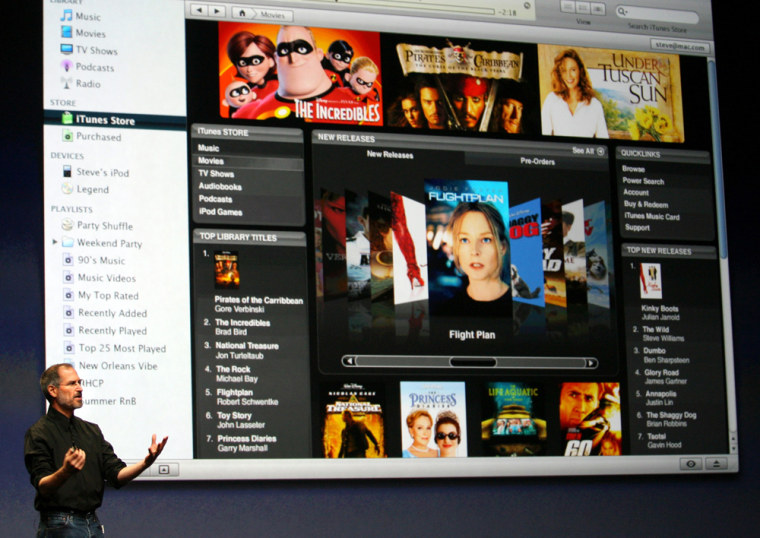Apple Inc. CEO Steve Jobs challenged major record labels to strip copying restrictions from music sold online, but their trade group fired back Wednesday, suggesting the company should open up its anti-piracy technology to rivals instead.
Doing so, argued Mitch Bainwol, chairman and chief executive of the Recording Industry Association of America, would eliminate technology hurdles that prevent music fans from buying songs at Apple's iTunes Music Store and playing them on devices other than the iPod.
"We have no doubt that a technology company as sophisticated and smart as Apple could work with the music community to make that happen," Bainwol said in a statement.
In an essay posted on the Cupertino-based company's Web site Tuesday, Jobs called on record labels to abandon their requirement for online music to be wrapped in Digital Rights Management, or DRM, technology that prevents unauthorized copying.
The DRM protections prevent the iPod from playing music bought from many other competing online stores.
Jobs said eliminating such restrictions would open up the online music marketplace.
The major record labels — Universal Music Group, EMI Music, Sony BMG Music Entertainment and Warner Music Group — control some 70 percent of the music market and have maintained that DRM safeguards are needed to stave off rampant piracy.
Calls to Apple were not returned Wednesday.
In his letter, Jobs said Apple is against licensing its own DRM technology, known as "FairPlay," as an alternative method for making iTunes accessible to all portable players.
Those same DRM protections also prevent the iPod from playing music bought from many other competing online stores.
Several analysts on Wednesday suggested the record companies should follow Jobs' suggestion.
"Clearly, DRM is not working," said Ted Schadler, an analyst at Forrester Research. "It sends a message to the customer that 'we don't trust you.'"
Phil Leigh, senior analyst at Inside Digital Media, suggested removing copy restraints would give the labels' music more exposure.
"Digital music has entered the mainstream," Leigh said. "The restrictions (the labels) require Apple and others to carry are preventing the market from developing to its full potential — it's retarding the growth."
Still, not everyone agreed dumping DRM is the best strategy for the record labels.
"Eliminating online DRM appears to us to be an overly risky move that eliminates the potential for a future digital-only distribution model free of piracy," Deutsche Bank analyst Doug Mitchelson wrote in research note Wednesday.
"As easily as Mr. Jobs lectured the music industry on their DRM policies, he could have lectured the software industry (which includes Apple) for its complete unwillingness to pursue an industrywide DRM standard or make any effort to help music companies in their fight against digital piracy by working to make their media players recognize and not play pirated songs," Mitchelson wrote.
Copy protection is necessary to make other business models, such as the all-you-want music subscription plans offered on services such as Napster, URGE and Rhapsody, or the limited song-sharing features in Microsoft Corp.'s Zune player, said David Card, music and media analyst for Jupiter Research.
"All these music services wouldn't work without DRM," Card said, adding that the labels do have a right to worry about abandoning DRM.
"They're very nervous about distributing content that is unprotected," Card said of the major music labels. "They think that everybody will share music and there's evidence that a lot of people will."
Other analysts pointed to the success of eMusic, an online service that sells music in the MP3 format, which is free of anti-piracy restrictions.
The service, owned by New York-based Dimensional Associates Inc., offers downloads from a catalog of more than 2 million tracks by independent artists through a subscription plan.
Britain's EMI Music has begun experimenting with releasing music in the DRM-free MP3.
In the last few months, the company has released tracks by Norah Jones, Lily Allen and the band Relient K.
"The results have been really positive. The feedback from fans (has) been very enthusiastic," said EMI spokeswoman Jeanne Meyer.
Whether EMI expands its offerings or other major labels follow suit remains to be seen. Leigh said he believes it will experiment further.
"I think the labels will release selected back-catalog stuff, to see what happens," Leigh said.
